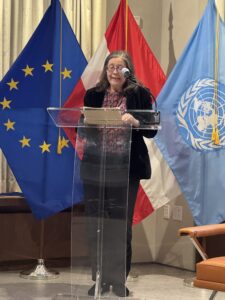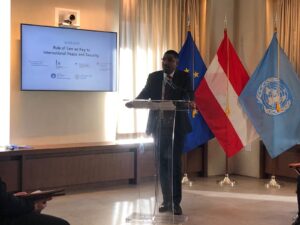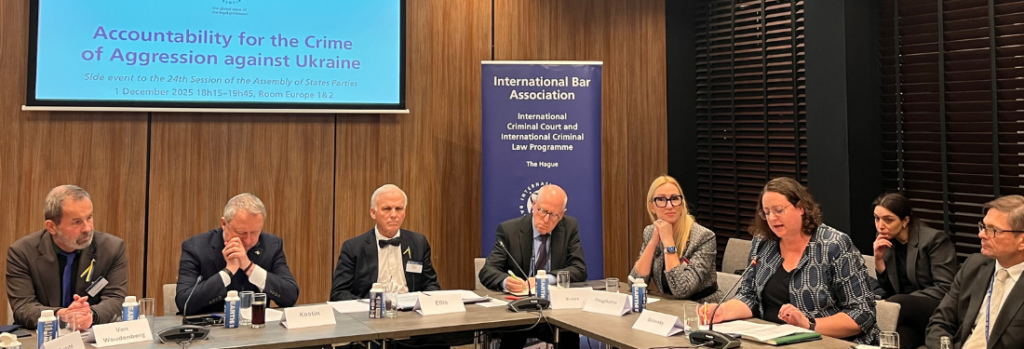

Our purpose: Promoting peace through criminal justice – preventing crimes of aggression
Through the United Nations Charter, States have expressed their commitment “to save succeeding generations from the scourge of war”. They have agreed to renounce the illegal threat or use of force, and to settle their disputes “by peaceful means in such a manner that international peace and security, and justice, are not endangered”. States have the legal duty to abide by this commitment and the UN Security Council has the primary responsibility to enforce it.The Nuremberg Trials made it clear that criminal justice also has an important role to play for the promotion of peace and the deterrence of acts of aggression – though it remained limited and theoretical for many decades thereafter. With the 2010 Kampala amendments to the Rome Statute of the International Criminal Court, States Parties created a new mechanism to enforce the most important rule of international law: the prohibition of the illegal use of force under the United Nations Charter. This website is dedicated to making accountability a reality.
News
Workshop on the Rule of Law: Charles Jalloh, Ambassador Christian Wenaweser and Convenor Jennifer Trahan spoke at the Austrian Mission to the United Nations on January 28–29, 2026. The workshop was entitled Rule of Law as Key to International Peace and Security and co-sponsored by the Permanent Missions of Austria, Liechtenstein, Slovenia, and Switzerland to the UN as well as the University of Vienna and Ludwig Boltzmann Institute. The panels were on The International Rule of Law, Democracy and Human Rights: Double Standards and the International Rule of Law; The Individual and the International Rule of Law; and the Guardians of the International Rule of Law. The discussion included the importance of Article 2(4) of the UN Charter, the crime of aggression, and the need to create a workable jurisdictional regime over the crime. The audience was comprised of diplomats, academics and civil society. The program can be found here.
Situation in Greenland: For a post entitled “The Prohibitions of Threat of Force Revisited: Greenland, Credibility and International Law,” authored by Louisa Handel-Mazzetti and Marten Zwanenburg, see here.
Statement by the Global Institute for the Prevention of Aggression on the Situation in Venezuela: The Global Institute for the Prevention of Aggression (GIPA) condemns the United States of America’s act of aggression against Venezuela. For the full statement, see here.
The Global Institute for the Prevention of Aggression congratulates Professor Gregory Gordon on the publication of his new book “Nuremberg’s Citizen Prosecutor: Benjamin Ferencz and the Birth of International Justice” (2025). 

Side events on the crime of aggression at the Assembly of States Parties: The crime of aggression was a key focus of side-event panels at the 24th session of the Assembly of States Parties to the ICC held in The Hague from 1 to 5 December 2025.
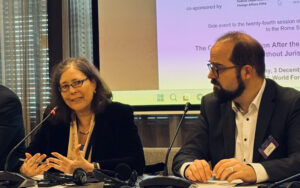
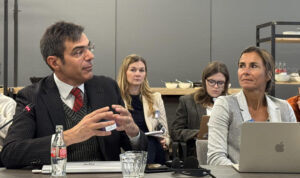
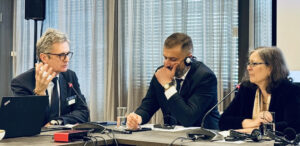 On 4 December 2025, the International Nuremberg Principles Academy organized a panel discussion on “80 years after Nuremberg – Quo Vadis, ICC? The Future of the International Criminal Justice in a Divided World”. Liechtenstein Ambassador Christian Wenaweser was among the panelists who explored strategies to ensure that the principles of Nuremberg continue to guide international justice amid global division.
On 4 December 2025, the International Nuremberg Principles Academy organized a panel discussion on “80 years after Nuremberg – Quo Vadis, ICC? The Future of the International Criminal Justice in a Divided World”. Liechtenstein Ambassador Christian Wenaweser was among the panelists who explored strategies to ensure that the principles of Nuremberg continue to guide international justice amid global division.
